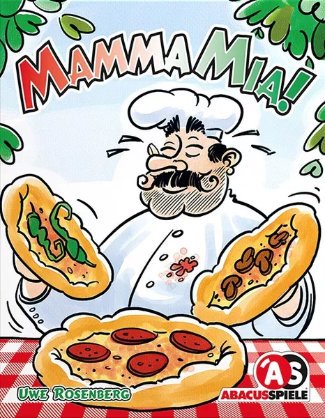Mamma Mia! Board Game Review

By MARK WILSON

Year Published: 1998
Players: 2-5
Playing Time: 30-45 Minutes
The worst part about this game is that every time I talk about it or play it, I have the theme tune from the musical Mamma Mia stuck in my head for at least a day or two. I have come to truly hate this aspect of playing it.
There. That’s the most negative thing I’ll have to say about Mamma Mia. Nearly everything else is positive. With that band-aid ripped off, let’s see what makes this odd card game from the 1990s tick.
Mamma Mia, the Premise
You’re baking a pizza, or rather many pizzas. And so is everyone else. At least you’re attempting to.
But this is the world’s least efficient pizzeria, and so you’re all using the same oven. You toss ingredients into the oven in turn order, and optionally one of a handful of recipe cards, until the deck is exhausted.
At that point, you flip over the whole deck and start pulling ingredients from the top, lining them up. Then when recipe cards are drawn, you see if the proper ingredients are available for the recipe. Oh, this calls for 1 mushroom and 4 peppers? Tough luck, there are only 2 peppers in the oven so far.
If this were the entire game, it would be a somewhat rote memory exercise, and nothing to write home about. But you’ll have a hand of cards, and can supplement the oven’s ingredients with your own when your recipes pop up. So now, I can supplement that recipe with 2 peppers from my hand and complete the order. This also depletes those ingredients, so that there are fewer for future recipes as they come up.
The Joy of the Approximate
Too many people call this a Memory Game. And it’s true! A good short-term memory and ability to recall general patterns can help.
But this also misrepresents the game, because the emergent calamity that will occur as a result of mishaps can’t be overstated. Slightly misremembered ingredients, or someone with an improbable number of pepperonis in their hand at the right moment, will shift the table’s mental landscape swiftly and wholly.
I like to call it a Gut Instinct game, rather than a memory game. I think this better represents actual play, and also the best way to play to optimize one’s fun in the experience.
Hand Management as Strategy
I glossed over one of the most important rules, because I wanted to talk more in depth about how it again changes the game’s simple yet intriguing equations.
Once you’ve played ingredients (as much as you want of a single ingredient type) and an optional recipe card, you draw your hand back up. But crucially, you draw from either recipes or ingredients, but not both.
You need recipes to score points. It’s how you win the game. But if you flood your hand with recipes, you have less ability to maneuver the oven to a state that will allow you to confidently commit a recipe to the oven.
Additionally, if you’re stuck with a lot of recipes at round’s end, they’re of no use to you as the deck is flipped. Better would be to have a hand of cards full of ingredients to use on your recipes as they come up.
Also, the when and why of keeping some ingredients in your hand, or committing them to the oven, presents interesting decisions on every turn, even if the decision is never overly complicated.
Managing this balance is tough, even with as little as five ingredients (six in the game’s sequel, Mamma Mia Plus, which adds the possibility for a 6th player).
So in terms of how the game feels to me, I would call it a hand management game as much as, or potentially more than, a memory game. This delicate balance is often the difference between winning and losing, and has little to do with one’s memory.
Mamma Mia! Conclusions
This is a strange game that has teetered on the edge of me purging it from my collection. This isn’t because I don’t enjoy it, but rather because the gameplay is quite unique, making it hard to “click” on an initial play.
This isn’t to do with the rules (which are quick to teach), but rather the flow and pacing of gameplay, and the time it takes most people to determine reasonable strategic heuristics for play.
Designer Uwe Rosenberg is known for this sort of thing: quirky card-based games that break the patterns we’re used to in gaming. It’s part of why I enjoy many of his designs. But it also means more people have bounced off of Mamma Mia than I’d expect, given the light rules overhead and goofy gameplay.
Still, for those who do click with it, it’s an amusing joy. Not quite a party game, not quite a memory game, not quite a full hand management strategy game, but possessing characteristics of all three. It’s this confluence of influences that makes it unique, and for which I enjoy it.
…
Like my content and want more? Check out my other reviews and game musings!
Read More From Bumbling Through Dungeons
Recent Posts
Categories
- All (354)
- Announcements (4)
- Board Games (206)
- DMing (28)
- Game Design (16)
- Playing TTRPGs (22)
- Reviews (192)
- RPGs (142)
- Session Reports (91)
- Why Games Matter (9)